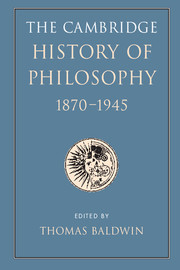Book contents
- Frontmatter
- Contents
- List of contributors
- Introduction
- I 1870–1914
- 1 Positivism, Idealism, and Pragmatism
- 1 Positivist thought in the nineteenth century
- 2 Neo-Kantianism: the German idealism movement
- 3 Idealism in Britain and the United States
- 4 Idealism in Russia
- 5 Bergson
- 6 Pragmatism
- 2 Psychology and Philosophy
- 3 Logic, mathematics, and judgement
- 4 Philosophy and the new physics
- 5 The idea of social science
- 6 Ethics, politics, and legal theory
- 7 Philosophy of religion and art
- Interlude
- II 1914–1945
- Biobibliographical appendix
- Bibliography
- INDEX
- References
3 - Idealism in Britain and the United States
from 1 - Positivism, Idealism, and Pragmatism
Published online by Cambridge University Press: 28 March 2008
- Frontmatter
- Contents
- List of contributors
- Introduction
- I 1870–1914
- 1 Positivism, Idealism, and Pragmatism
- 1 Positivist thought in the nineteenth century
- 2 Neo-Kantianism: the German idealism movement
- 3 Idealism in Britain and the United States
- 4 Idealism in Russia
- 5 Bergson
- 6 Pragmatism
- 2 Psychology and Philosophy
- 3 Logic, mathematics, and judgement
- 4 Philosophy and the new physics
- 5 The idea of social science
- 6 Ethics, politics, and legal theory
- 7 Philosophy of religion and art
- Interlude
- II 1914–1945
- Biobibliographical appendix
- Bibliography
- INDEX
- References
Summary
In 1856 the leading Oxford philosopher of his generation, Henry Longueville Mansel, later Waynflete Professor of Moral and Metaphysical Philosophy, Canon of Christ Church, and Dean of St Paul’s, gave a lecture on the philosophy of Kant in which he described the value of studying German philosophy, particularly that of Schelling and Hegel. ‘Presumptuous’, he said, ‘as [their] conceptions must appear to us, daringly profane as their language must sound to one who believes in a personal God, their study is not without its value in the reductio ad absurdum which it furnishes of the principles from which such conclusions spring’ (Mansel 1856 [1873: 181]). Despite this backhanded recommendation in one of the first serious discussions of German absolute idealism in English, within twenty years English-speaking philosophers were on their way to domesticating what they had learned from Kant and Hegel and using it to supplant the two previously dominant philosophies in Britain and North America, British empiricism and Scottish common-sense realism. The sudden rise of idealistic philosophy, with its wide influence through religion and politics, does not seem explicable except as a response to the nineteenth-century crisis of faith. English-speaking philosophers found in idealism a defence of religious emotions which they were able to enlist in the cause of social reform (Richter 1964: 134).
EARLY BRITISH IDEALISM
In Britain, the nineteenth-century crisis of faith was produced by a confrontation between evangelical Christianity and seemingly incompatible forms of knowledge, particularly higher criticism of scripture and Darwin’s biology. Evangelical Christianity was grounded in a belief in the literal truth of scripture. Beginning in the late eighteenth century, an evangelical revival had by the nineteenth century carried this belief into most aspects of Victorian society. When higher criticism showed that the Gospels were not the simple eyewitness stories they purported to be and when biologists rejected the literal truth of the creation story in Genesis, the fabric of Victorian life came under attack.
- Type
- Chapter
- Information
- The Cambridge History of Philosophy 1870–1945 , pp. 43 - 59Publisher: Cambridge University PressPrint publication year: 2003
References
- 2
- Cited by



